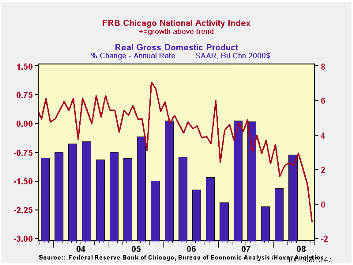 Global| Oct 21 2008
Global| Oct 21 2008Chicago Fed Index Fell Deeper Into Negative Territory
by:Tom Moeller
|in:Economy in Brief
Summary
The National Activity Index (CFNAI) from the Chicago Federal Reserve Bank for September moved deeper into recession territory. The reading of -2.57 was the lowest since early during the 1981-82 recession.The current index level was [...]

The National Activity Index (CFNAI) from the Chicago Federal Reserve Bank for September moved deeper into recession territory. The reading of -2.57 was the lowest since early during the 1981-82 recession.The current index level was then associated with -6.4% (AR) growth in real GDP during 1Q 1982.
The three-month moving average of the index also fell to -1.78 from -1.18 during August. The latest was its lowest since the last recession, early in 1991.
An index level at or below -0.70 typically has indicated negative U.S. economic growth. A zero value of the CFNAI indicates that the economy is expanding at its historical trend rate of growth of roughly 3%. During the last twenty years there has been a 68% correlation between the level of the CFNAI and q/q growth in real GDP.
The complete CFNAI report is available here and the historical data are available in Haver's SURVEYS database.
The production and income categories made the largest negative contribution to the total index's decline during September, though each of the component categories added a negative influence.
Inflationary pressure also was indicated to be low for the coming year with price index at it's lowest since 1990.
The CFNAI is a weighted average of 85 indicators of economic activity. The indicators reflect activity in the following categories: production & income, the labor market, personal consumption & housing, manufacturing & trade sales, and inventories & orders.
In a separate survey, the Chicago Fed indicated that its Midwest manufacturing index fell. The August index level reversed its recent improvement and fell to the lowest level since 2003. A decline in the auto sector component of the series led the weakness.
Revisiting Useful Approaches to Data-Rich Macroeconomic Forecasting from the Federal Reserve Bank of New York is available here.
| Chicago Fed | September | August | September '07 | 2007 | 2006 | 2005 |
|---|---|---|---|---|---|---|
| CFNAI | -2.57 | -1.61 | -0.30 | -0.43 | -0.03 | 0.27 |
| 3-Month Average | -1.78 | -1.18 | -0.32 | -- | -- | -- |
Tom Moeller
AuthorMore in Author Profile »Prior to joining Haver Analytics in 2000, Mr. Moeller worked as the Economist at Chancellor Capital Management from 1985 to 1999. There, he developed comprehensive economic forecasts and interpreted economic data for equity and fixed income portfolio managers. Also at Chancellor, Mr. Moeller worked as an equity analyst and was responsible for researching and rating companies in the economically sensitive automobile and housing industries for investment in Chancellor’s equity portfolio. Prior to joining Chancellor, Mr. Moeller was an Economist at Citibank from 1979 to 1984. He also analyzed pricing behavior in the metals industry for the Council on Wage and Price Stability in Washington, D.C. In 1999, Mr. Moeller received the award for most accurate forecast from the Forecasters' Club of New York. From 1990 to 1992 he was President of the New York Association for Business Economists. Mr. Moeller earned an M.B.A. in Finance from Fordham University, where he graduated in 1987. He holds a Bachelor of Arts in Economics from George Washington University.
More Economy in Brief
 Global| Feb 05 2026
Global| Feb 05 2026Charts of the Week: Balanced Policy, Resilient Data and AI Narratives
by:Andrew Cates






